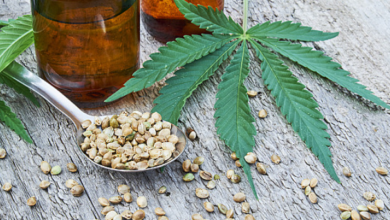Difference Between Tch and Cbd

The distinction between THC and CBD is fundamental to understanding their applications and effects. THC, known for its psychoactive properties, plays a significant role in recreational use and certain therapeutic contexts. Conversely, CBD offers therapeutic benefits without intoxication, appealing to those seeking relief from various conditions. This divergence raises important questions about their legal status, medical uses, and implications for consumers. What factors influence individuals' preferences for one cannabinoid over the other?
Understanding THC: The Psychoactive Cannabinoid
Although often confused with other cannabinoids, tetrahydrocannabinol (THC) is distinct for its psychoactive properties, which significantly influence both recreational and medicinal cannabis use.
The effects of THC include euphoria, altered perception, and relaxation, making it popular among users seeking relief from stress or pain.
Additionally, THC is utilized in various therapeutic applications, such as appetite stimulation and alleviating nausea, highlighting its multifaceted uses.
Exploring CBD: The Non-Psychoactive Alternative
Cannabidiol (CBD) stands out as a prominent cannabinoid known for its non-psychoactive properties, making it a compelling alternative to THC.
The potential CBD benefits include relief from anxiety, inflammation, and chronic pain, appealing to those seeking natural therapies.
Proper CBD dosage is crucial for maximizing effects and minimizing side effects, allowing individuals the freedom to explore its therapeutic possibilities without unwanted psychoactive sensations.
Comparing the Effects of THC and CBD
While both THC and CBD are cannabinoids derived from the cannabis plant, their effects on the human body differ significantly.
THC effects include psychoactive sensations, potential anxiety, and altered perception, while CBD benefits encompass anxiety reduction, anti-inflammatory properties, and relief from seizures.
This fundamental distinction highlights the diverse applications and experiences associated with each cannabinoid, appealing to individuals seeking various therapeutic outcomes.
Legal Status and Medical Uses of THC and CBD
As the legal landscape surrounding cannabis continues to evolve, the status of THC and CBD varies significantly across jurisdictions.
Legal implications affect access to these compounds, influencing ongoing medical research. THC, often restricted, is recognized for its psychoactive properties, while CBD enjoys broader legality due to its therapeutic potential.
Understanding these differences is crucial for patients seeking informed treatment options within an evolving legal framework.
Conclusion
In summary, THC and CBD present distinct profiles that cater to varied therapeutic and recreational needs. While THC is primarily associated with psychoactive effects and euphoria, CBD offers a non-intoxicating alternative with its own therapeutic benefits. Notably, a 2021 survey revealed that approximately 64% of CBD users reported improvements in their anxiety symptoms, highlighting the compound's growing acceptance in mental health management. This underscores the importance of understanding each cannabinoid's properties and potential applications in health and wellness.






